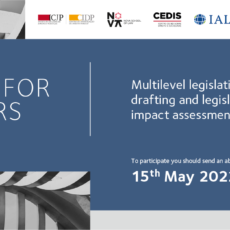
Greece, a civil law jurisdiction, has prioritized regulatory quality as a means of serving democracy and human rights, creating a safe and solid environment for its citizens and residents, establishing a solid regulatory framework, reducing administrative burdens, combatting corruption, stabilizing the economy, and attracting foreign investors.
The Law on the Executive State (Law 4622/2019), adopted by the Greek Parliament in late 2019, introduced far reaching reforms aiming to improve the quality of regulation and legislative drafting. From the point of view of legislative process and drafting, the main innovations are:
- The promotion of regulatory efficacy and legislative effectiveness as the conceptual basis for regulatory reform, and law-making;
- the introduction of a clear step by step procedure for regulatory reforms, including legislative process and legislative drafting: the procedure sets and allocates the tasks for each regulatory actor, creates a seamless and participatory practice in accountable law-making, and brings together the piecemeal and so far independent institutional processes within an ethos of strategic unity, accountability, and participation;
- the establishment of a Westminster-style centralized body (General Secretariat of Legal and Parliamentary Affairs) as the ‘gatekeeper’ for regulatory, parliamentary, and legislative drafting quality;
- the establishment of two intra-governmental Committees, the Committee of Scrutiny of Legislative Process (as a watchdog of regulatory quality for new Bills) and the Committee for Codification (with a new agenda for the scrutiny of existing legislation); and
- the publication, and circulation to all regulatory actors, of two principle-based modern manuals, the Manual for the Scrutiny of Legislative Process and Legislative Drafting, and the Manual for the Scrutiny of the Effects of Legislation.
Prof. Dr. Helen Xanthaki, UCL, Dean of PGLaws, University of London, President of the International Association of Legislation, and CALC member, and Dr. Maria Mousmouti, Lecturer in Law, IALS, Executive Director, Centre for European Constitutional Law, Secretary to the International Association for Legislation, and CALC member served as the two extra-government experts for the team that drafted the Manual for the Scrutiny of Legislative Process and Legislative Drafting. Their academic work permeates the Manual and is cited in its bibliography. A summary of the manual is currently being translated and will be available soon.
Similarly, Dr, Constantin Stefanou, Director of the Sir William Dale Centre for Legislative Studies, Director of Taught Courses, IALS, and a member of the International Association of Legislation and CALC served as the sole non-government expert to the team that drafted the Manual for the Scrutiny of the Effects in Legislation and influencing its concept, design, and content.





